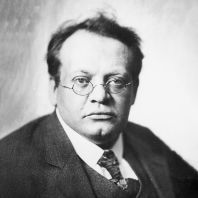Max Reger
composer
Although Max Reger died at the age of only 43, he left behind an impressively large body of work. It includes piano, chamber and orchestral music, songs and choral pieces, but no stage works, which places Reger in the tradition of Johannes Brahms. There is also an extensive œuvre for the organ. In addition to composing, Reger’s workload included countless performances as organist, pianist and conductor as well as an intensive teaching career. In the last years of his life, he appeared several times with the Berliner Philharmoniker as a conductor and once as a pianist.
Max Reger, who grew up in Weiden in the Upper Palatinate in Germany, was encouraged musically at an early age and studied in Sondershausen and Wiesbaden. As a workaholic and because of his sometimes excessive alcohol consumption, the composer’s mental and physical condition was fragile throughout his life. His most important professional positions included professor at the Königliches Konservatorium in Leipzig and, from 1911 to 1914, as court conductor of the famous Meininger Hofkapelle – where Hans von Bülow and, considerably later, Kirill Petrenko also worked before him. Many contemporaries admired Reger: Paul Hindemith called him the “last giant of music”, Arnold Schoenberg a “genius”. At Schoenberg’s Society for Private Musical Performances, Reger was the most frequently performed composer. Reger’s greatest role models were Bach, Mozart, Brahms and Wagner. His music combines Baroque counterpoint and late Romantic chromaticism to create a complex tonal language that sometimes pushes the boundaries of tonality. Among the highlights of the composer’s orchestral work are the solo concertos for violin and piano, and several cycles of variations. In the opening concert of the 2023/24 season, the Berliner Philharmoniker and chief conductor Kirill Petrenko presented Reger’s Variations and Fugue on a Theme by Mozart.